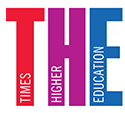Leading professor proposes charter to protect free exchange of knowledge
Higher education organisations must start discussing ways to push back against the “securitisation” agenda of some national governments, otherwise global science is in “real trouble”, a leading scholar has warned.
Simon Marginson, professor of higher education at the University of Oxford, said the international academic community had just “rolled over” and accepted security services’ meddling in cross-border collaboration “too easily”.
Speaking to Times Higher Education, Professor Marginson said there was a need to “awaken the consciousness” of the scientific community about the consequences of increased securitisation.
He highlighted Western governments’ concerns about cooperation with China as the main issue, given that Russia’s science system had already been relatively isolated before the Ukraine war and was now isolating itself even further.
So far, it was only in the US where fears about China had led to individual scientists being targeted, but action should be taken before similar developments occurred elsewhere, Professor Marginson added, noting “alarmist” statements being made in other countries about the risks of working with Chinese researchers.
“I don’t think you can control geopolitics by regulating science. Knowledge flows to militaries freely…all the time. Open science creates insights and data which are then used for purposes that many of us would disagree with,” he said.
“That is going to happen regardless. You can’t prevent those uses that you don’t like…by trying to regulate the science and technology…without compromising the processes of science quite irretrievably.”
Professor Marginson said it has always been possible to “quarantine” off research that directly relates to military use, but a firm line should be drawn to stop security services from going further, into blanket regulation of all international cooperation with designated countries on security grounds.
Ideally, this would involve international higher education and research organisations – such as the International Association of Universities – “creating an environment that fosters scientific freedom, in the manner of a human rights organisation that defends human rights”. This would entail laying down academic freedom rules, perhaps through a charter that should be respected by nation states.
Such a framework would be “very important” to individual researchers as if “you have an international organisation strongly supporting your right to a normal scholarly life and pushing against any infringement of this, it draws attention to your case, it gives you alternative avenues of employment, it means your career is less likely to be destroyed on the basis of your past or present links”.
“We need to start to talk about this problem in the organisations that span borders,” he said. “Everyone has just rolled over and accepted the growing securitisation of science too easily. There is pushback but it is kind of muted.”
Professor Marginson said without action there was a real risk that the open global science system that had been built up over the past 20 years could contract, with data already pointing to damage to collaboration between the US and China, and Australia and China.
“Global science as such is in jeopardy if national governments can over-determine normal collaborative relationships and shape the pattern of scientific decisions,” he said. “It is not just going to get a bit smaller; it is in real trouble.”

0 Comments